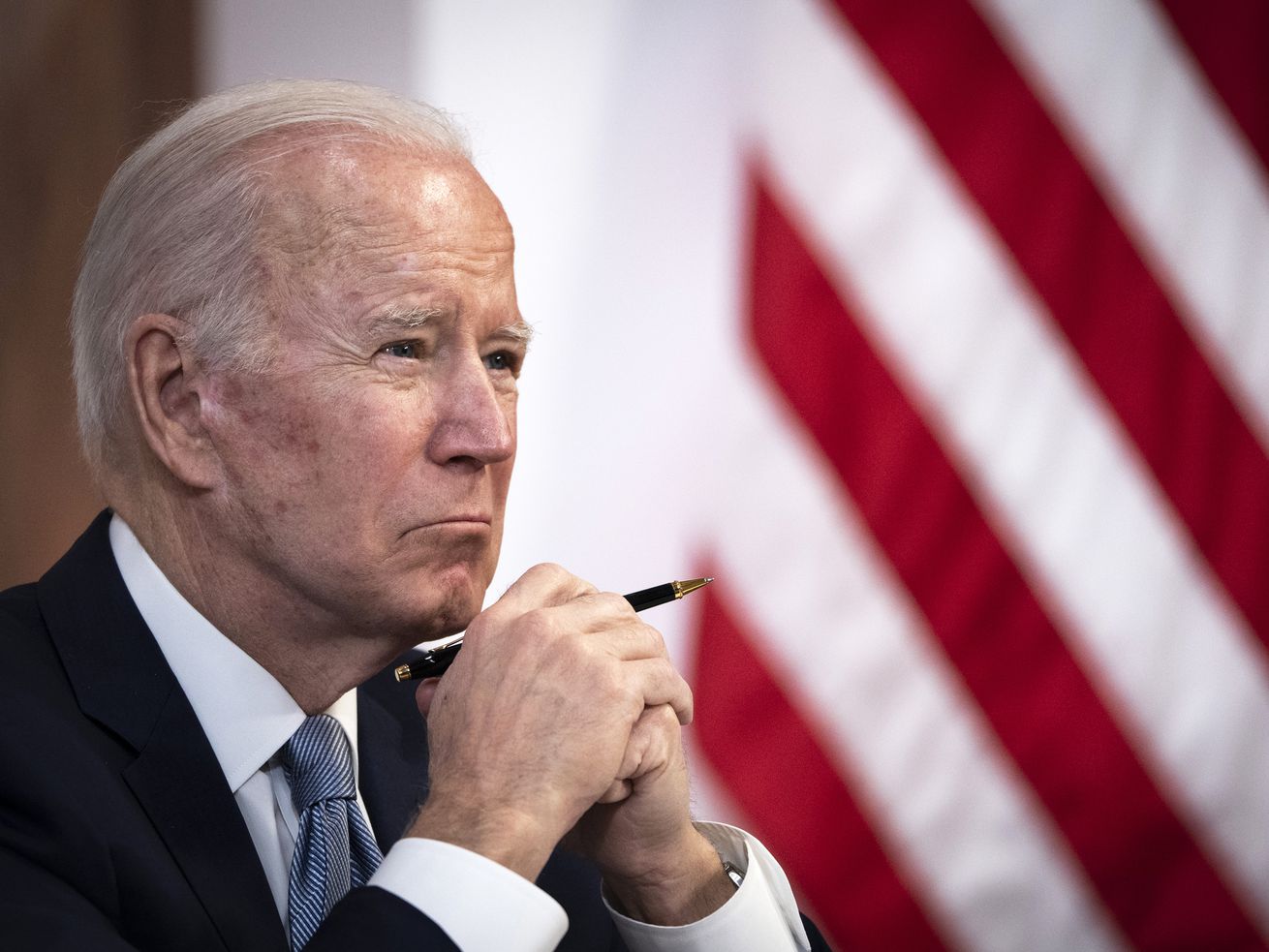Biden is limited on abortion rights. There’s still a lot he could try.
In the days since a leaked opinion showed the Supreme Court appears on track to overrule Roe v. Wade, a sort of acceptance seems to have set in among government officials.
Democrats are constrained in Congress, due to both their narrow Senate majority and the disagreement within their caucus about abortion rights, so any federal legislation is likely off the table for now. The White House, too, is starting to signal that its options are limited, with outside advisers telling the Washington Post about the obstacles ahead.
This response speaks to real challenges that lawmakers are running up against, and the legal pushback the White House could encounter on any executive actions. But it’s still been disappointing for advocates, who want the Biden administration to take more creative approaches that could keep up the fight on abortion access.
There are no silver bullets here. Anything the administration tries would almost certainly be contested, often in courts full of Republican appointees. And while they might help on the margins, none of the actions available would fully restore abortion rights in states where they’re being threatened.
“I think whatever comes next is a novel legal tactic. I would be really pessimistic that the courts, stacked that they are, would be receptive, but that doesn’t mean we shouldn’t try,” says Khiara Bridges, a UC Berkeley law professor and faculty director for the Center on Reproductive Rights and Justice.
In a press statement on Tuesday, Biden said he’d called on the White House Gender Policy Council and the White House counsel to “prepare options for an administration response.” He noted, too, that the administration would have its plans ready when a Supreme Court decision is finalized. “We will be ready when any ruling is issued,” Biden emphasized. A White House spokesperson did not respond to a request for comment for this story.
According to experts and advocates who spoke with Vox, here are a few avenues the administration could consider.
Increase access to medication abortion by challenging state laws
The administration could take on state laws that are limiting people’s access to medication abortion, also known as the abortion pill. This “pill,” which actually includes two medications — mifepristone and misoprostol — was first approved by the FDA in 2000 and used in 54 percent of abortions in 2020.
If successful, this could allow people in all states, even places where there are abortion bans, to obtain a medication abortion up to 10 weeks into a pregnancy.
The FDA has already issued regulations that make it easier to obtain a medication abortion. In April 2021, it approved changes that enabled people to receive a prescription via telemedicine and get medication through the mail, a regulation the agency made permanent in December.
Nineteen states, however, have passed laws that directly contradict the FDA’s regulations, requiring people to consume abortion pills with a clinician present.
Legal experts argue that the Department of Justice could challenge these laws since federal regulations supersede state policies. If Roe falls, this would also mean that such challenges could attempt to preserve access to medication abortion in all states, even those that try to implement wholesale bans.
“A similar argument previously worked for a different drug,” write Drexel University law professor David Cohen, University of Pittsburgh law professor Greer Donley, and Temple University law professor Rachel Rebouché, in a New York Times op-ed outlining potential executive actions. In 2014, a pharmaceutical company challenged Massachusetts’s attempt to regulate an opioid drug differently from the federal government, and won.
In this scenario, the legal challenge could be brought by the Department of Justice, a manufacturer of medication abortion, or abortion providers. When asked about this option, a Biden adviser told the New York Times that the president wouldn’t be telling DOJ what to do.
This approach, like any that Biden takes via executive action, is poised to face significant opposition. One gray area, says Boston University law professor Nicole Huberfeld, is the jurisdiction states have over what physicians and providers are able to do, since the FDA’s authority doesn’t cover limits a state places on doctors and pharmacists.
Were the challenge to succeed, however, it could mean that people in all 50 states would be able to access medication abortion.
“We are well aware that these could be challenged and they could lose, but there’s no reason to cut off options before you try them and let the other side win before you even fight the battle,” Cohen told Vox.
Allow clinics to establish themselves on federal lands
In states that have imposed abortion bans, the federal government could also try to lease out federal lands and allow clinics to operate on them.
Because federal lands aren’t subject to states’ civil laws, and there’s room to interpret criminal laws, clinics could theoretically establish themselves on places like military bases and tribal lands, without having to deal with a state’s bans. “Even though the land is inside the border of a state, it wouldn’t be governed by the laws of a state,” says Bridges.
Any activity on these lands would instead be governed by federal law, meaning providers who operate there and people who travel there for abortions wouldn’t have to face state penalties. Cohen notes that there are past cases when a state’s right-to-work laws have not applied to how companies approach unionization if they are located on federal lands.
The exact approach, though, is untested and is also poised to get legal pushback from those who are opposed.
Enforce Medicaid coverage in states that try to implement outright bans
Because of the Hyde Amendment, federal funds can’t be used for most abortions, though there are exceptions for rape, incest, and cases when a pregnant woman’s life is endangered. In practice, this has meant that Medicaid isn’t able to cover many abortions, though it can still be used in rare instances. (States can also use their own Medicaid money to cover abortions, but the federal government has little say in how these funds are applied.)
Some states, including Arkansas, Kentucky, and Louisiana, have trigger laws that would go into effect if Roe is overturned. These laws would ban abortion even in the cases of some of the exceptions outlined in the Hyde Amendment. The Arkansas law, for example, makes no exceptions for cases of rape or incest.
For bans like these, the administration could argue that federal Medicaid funds should still be used to cover abortions in the narrow areas where they apply. The Department of Health and Human Services could encourage states to maintain coverage of abortion in these specific cases, as well as abortion services.
“The states are supposed to cover abortion services allowed by the Hyde Amendment under Medicaid,” says University of Pennsylvania law professor Allison Hoffman. “HHS could encourage them to do so. HHS could also try to enforce a state’s violation of federal law by not covering it.”
This policy wouldn’t apply to many abortions, and could also face legal challenges, but it could ensure that a segment of people would still be able retain access.
Such enforcement would likely come in the form of a warning that HHS issues to states, says Boston University law professor Nicole Huberfeld. The agency is unlikely to withhold Medicaid funding because of the damage that would cause to providers and recipients, she notes.
Advocates want more from the White House
Advocates have long rebuked the White House for not doing enough on abortion rights, both at the bully pulpit and in policy implementation. Biden, for example, said the word “abortion” publicly for the first time since he took office just this week.
In addition to executive actions, activists have pushed the president to be more vocal about his support on the subject in general. “If he won’t even talk about abortion (no votes or budget needed) or give us a plan he’s won’t go bold to protect us,” We Testify executive director Renee Bracey Sherman posted on Twitter on Wednesday.
Biden has been hesitant to embrace abortion rights for much of his career. He questioned the initial Supreme Court decision on Roe and once voted for an amendment that would have allowed states to overturn it, changing course in 1983. Similarly, on the Hyde Amendment, he previously favored keeping it and relented after severe blowback from his party.
Biden’s reluctance to use the term “abortion” is also tied to what he sees as politically tenable. “Longtime advisers said that Mr. Biden’s position on the issue was clear and that he preferred to use words like ‘privacy’ rather than ‘abortion’ because it appealed to a wider swath of the public,” the New York Times’s Peter Baker reported.
Advocates note that they’re merely urging the administration to consider all the channels that are available, even if prospects look bleak.
“We’ve seen over the past few years and the pandemic what the federal government could do,” says Morgan Hopkins, the executive director of campaigns at advocacy group All Above All. “People who need abortions deserve that kind of energy.”
Author: Li Zhou
Read More



